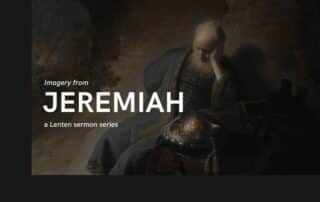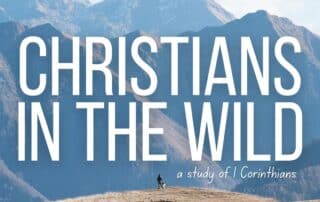One of the most beautiful sights in nature, in my opinion, is sun streaming through an opening in an overcast sky. The transforming power of light is striking and surprising. A landscape without bright light is flat and monotonous, but streaks of sunshine reveal all the color and depth that had been hidden. In chapter 31 of Jeremiah, we see how God plans to transform the repentant Judah — and all of Israel — in ways that no one living at the time could have possibly imagined. Eventually, the prophet says, God’s promise will stretch far beyond these nations to embrace all people, through the redemptive power of Jesus’s death and resurrection.
The transformation foreseen by Jeremiah is surprising because Israel itself, though repentance, holds the key to unlocking the power of God’s redemption:
“I have surely heard Ephraim’s moaning:
‘You disciplined me like an unruly calf, and I have been disciplined.
Restore me, and I will return, because you are the Lord my God.
After I strayed, I repented; after I came to understand, I beat my breast.
I was ashamed and humiliated because I bore the disgrace of my youth.’ Jeremiah 31:18-19 NIV
God’s forgiveness will be complete:
“For I will forgive their wickedness and will remember their sins no more.” Jeremiah 31:34b
God’s forgiveness comes from His heart as a loving father:
They will come with weeping; they will pray as I bring them back.
I will lead them beside streams of water on a level path where they will not stumble,
because I am Israel’s father, and Ephraim is my firstborn son. Jeremiah 31:9 NIV
God’s forgiveness is expansive, covering not only Judah but all of the nations of Israel:
“At that time,” declares the Lord, “I will be the God of all the families of Israel, and they will be my people.” Jeremiah 31:1 NIV
Throughout waywardness and repentance, God respects the agency of Israel and is ready to forgive. How could it be that the God of the universe has so much respect for His creation? Who could imagine this could be?
Jeremiah’s dreary and monotonous warnings are replaced with an unimaginably beautiful picture of the “Shalom” that God has in mind for Israel:
They will come and shout for joy on the heights of Zion; they will rejoice in the bounty of the Lord —
the grain, the new wine and the olive oil, the young of the flocks and herds.
They will be like a well-watered garden, and they will sorrow no more.
Then young women will dance and be glad, young men and old as well.
I will turn their mourning into gladness; I will give them comfort and joy instead of sorrow. Jeremiah 31:12-14 NIV
I would love to be able to step into this image.
The transformation Jeremiah envisions for Israel foreshadows the promise of Christ’s ultimate forgiveness and redemption for all people everywhere:
“This is the covenant I will make with the people of Israel after that time,” declares the Lord.
“I will put my law in their minds and write it on their hearts.
I will be their God, and they will be my people.
No longer will they teach their neighbor, or say to one another, ‘Know the Lord,’
because they will all know me, from the least of them to the greatest,”
declares the Lord. … Jeremiah 31:33-34 NIV
Jeremiah foreshadows the words of Jesus when he says:
“…. I will refresh the weary and satisfy the faint.” Jeremiah 31:2b
“Come to me, all you who are weary and burdened, and I will give you rest. Take my yoke upon you and learn from me, for I am gentle and humble in heart, and you will find rest for your souls….” Matthew 11:28-29 NIV
This promised redemption will completely erase any wearying and incomplete self salvation plans people can devise. God will replace them with the freedom and peace of His salvation that is offered to all in Christ.
Application:
Take a moment to soak in the amazing transformation that God makes available to us in Christ. Do you have plans for self salvation that are getting in the way of this transformation? Prepare for the hope of Easter. Take a moment to ask God to reveal how you might need to repent and turn back toward Him. Remember that He is a loving father waiting to forgive.



